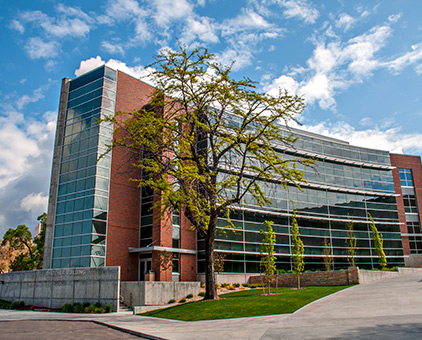Physics Teaching
Bennion
Center
Courses
Getting Started
- Build your math skills in PHYS 1500, if applicable
- Take PHYS 1980 to learn about resources and opportunities
- Meet with your advisor to plan your course path
- Take EDU 1010: Intro to Teaching
Making Progress
- Meet with your advisor regularly
- PHYS 2710: Physics III: Modern Physics & Thermodynamics
- PHYS 3010: Physics IV: Intermediate Mechanics with Relativity
- SCI 5050: Science of Learning
- PHYS 3980: Undergrad Seminar II
- Select practical and advanced physics electives that align with your interests
Finishing Up
- Complete science and education classes - PHYS 4010 & 5140, SCI 5170
- Review degree audit with your advisor and apply for graduation
- Apply for the M.Ed program, if desired
Community
Getting Started
- Participate in the PANDA Network
- Join a student group – Society of Physics Students, PASSAGE, or Science in the Parks
- Connect with faculty after class or during office hours
Making Progress
- Apply to become a PANDA Mentor
- Run as an officer in SPS or PASSAGE
- Apply to be a College of Science Ambassador
- Apply for Teach for Utah or Noyce Scholars
- Explore student groups, look into community-engaged learning opportunities, and connect with campus organizations that align with your interests
Knowledge & Skills
Getting Started
- Learn Python and basic programming skills and how they relate to physics
- Build your introductory calculus and math fluency skills
- Explore opportunities and resources in PHYS 1980
Making Progress
- Add linear algebra and differential equations to your math skills
- Choose practical or advanced electives to explore your interests
- Organize study groups with your peers
- Begin research with a faculty member
- Apply for an internship to build your experience. Find internships through the College of Science or connect with a Career Coach in the CPDC
Finishing Up
- Show your expertise by presenting at poster sessions, symposiums, or professional conferences
- Work in a local classroom to gain experience
- Complete your Honors thesis, if applicable
Transformation
Getting Started
- Declare your major
- Talk with your professors about career options
- If interested in learning abroad, complete Learning Abroad 101
Making Progress
- Attend research symposiums or seminars to explore physics or education topics
- Participate in science outreach in the community
- Attend a workshop or training through the Counseling Center or Center for Student Wellness
- Visit the Natural History Museum of Utah or attend local events using your ArtsPass
- Ask your faculty for letters of recommendation
- Draft your Teaching Philosophy statement
Finishing Up
- Present research projects at poster sessions, symposiums, or professional conferences
- Gain experience by completing clinical or practicum hours in a local classroom
Impact
Getting Started
- Join a student group on campus to find your people
- Volunteer at the Bennion Center
Making Progress
- Apply to become a Learning or Teaching Assistant to help other students
- Become a tutor with the Math Tutoring Center or Learning Center
- Participate in science outreach opportunities to interact with the community
- Become a PANDA Mentor for new students
- Apply to participate in the Bennion Center’s Alternative Breaks program
Finishing Up
- Get involved in Undergrad Student Advisory Committee (USAC) to shape department policies and decisions
Careers
Getting Started
- Meet with a Career Coach to explore different career paths
- Activate your Handshake account to find jobs, internships, and career events
Making Progress
- Visit the CPDC to get help with your resume and cover letter
- Conduct an informational interview with someone in your field of interest
- Connect with alumni via the Alumni Association or ForeverUtah
- Update your resume and draft a cover letter at the CPDC
- Attend Career Fairs to find internships and job opportunities
Finishing Up
- Attend career fairs hosted by local school districts
- Meet with a Career Coach to practice interview and negotiation skills and to polish your resume
- Apply for the M.Ed. program, if desired
Start Your Career Journey
Find support at the Career and Professional Development Center (CPDC)
About the Major
Learning Outcomes
- Problem Solving: Physics students can (a) identify the essential physical principles underlying both idealized and real-world problems, (b) express problems in the language of mathematics, and (c) solve problems alone and in teams using a variety of tools including estimation, simplified models, computational methods, and graphical representations.
- Science Methods: Physics students can (a) articulate the role of observation and the interplay between experiment and theory in scientific progress, (b) collect and analyze experimental data, and (c) estimate and understand the statistical significance and confidence levels of an experimental result.
- Science Communication: students can present experimental results and complex physics principles in both written and oral formats with proper citations.
- Science and Society: Students are able to (a) apply physics concepts to contemporary systems and (b) recognize the contributions and value of diverse perspectives, backgrounds, and identities within physics and science.
Plan & Prepare
At the U, we plan for our students to have an exceptional Educational Experience identified by four broad categories we call the Learning Framework: Community, Knowledge & Skills, Transformation, and Impact. This major map will help you envision, explore, design, and plan your personalized Exceptional Education Experience with the Learning Framework at the core. In addition to assisting you in planning your coursework and navigating the requirements of your major, this map will help you incorporate other kinds of experiences to expand your knowledge, support your development, and prepare you for the future you want.


